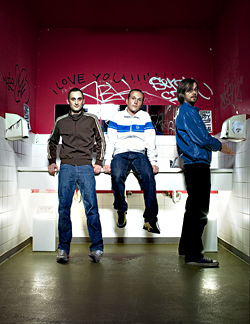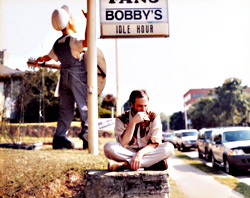“We don’t see things as they are, we see things as we are,” wrote Anaïs Nin. Even if the marketers weren’t watching, there would still be plenty of “we” in the products we consume and signs we pass by every day. They make up the negative space in our lives. David Best relays a non sequitur inventory throughout Transparent Things, the second full-length from U.K. electronic trio Fujiya & Miyagi: litterbugs, photocopiers, sneakers, European language schools, singer-songwriters. While the self-absorbed Nin could see her reflection in a ring of cigarette smoke, Best is busy examining the type on a pack of Lucky Strikes. He sing-speaks a ready-made philosophy: “I look through transparent things and I feel okay.”
Everything’s copy in the mash-up age; try YouTubing the Velvet Underground’s “Sister Ray” dubbed over musicians on The Lawrence Welk Show or copping rhymes from Gray’s Anatomy—words chosen with a pop art sensibility, stripped of meaning and employed for sound. With Transparent Things, Fujiya & Miyagi—cribbing their name from a turntable manufacturer and Pat Morita’s fictional sensei, respectively—make magnetic poetry of our collective news ticker. It’s no surprise that Fujiya & Miyagi would title their 2002 debut Electro Karaoke, a nod to appropriation.
Transparent Things, which recentlyarrived domestically on the Deaf, Dumb & Blind label, made a splash with Web 2.0 when it was released in Europe last spring, its glitchy rhythms and non sequitur lyrics tailor-made for the “You” decade. With a simple chant of the band name serving as its chorus, “Ankle Injuries” takes the form of a sticky ad jingle (say it: “By Mennen”). “Like pixelated scraps of jazz mags in your headlights,” Best intones, broadening his message like a pan shot of Times Square. Matt Hainsby’s bass is as syncopated as hispartner’s delivery, having more in common with Krautrock’s steely pulse than a Donna Summer sweat-down. The trio takes its funk from Neu!, who pared the verse-chorus-verse structure of rock down to the minimal motorik beat.
Best assembles a studious rap with “Collarbone” (“Toe bone connected to the neck bone/Neck bone connected to the collarbone”), turning a tale of a twice-broken bone into a coming-of-age story with perfect product placement: “Got to get a new pair of shoes/To kick it with her/Can I kick it with you?” he adds with a still-childish coo. “In One Ear and Out the Other” carries the refrain “You get to know your place on the food chain,” built around Steve Lewis’ canned beats and faux-Gallic chortle that’s part techno, part “Wild and Crazy Guys.”
Kraftwerk’s “Pocket Calculator,” introduced in 1981, was computer love at first sight for proto-robotics geeks, escalating the keypad like Duchamp’s urinal and calling it art. Similarly, “Photocopier” is Fujiya & Miyagi’s Texas Instrument, an ode to that thing that makes the workaday doldrums alive with recycled breakbeats and Best’s Xeroxed stutter: “You’re losing, you’re losing some bodily fluids” and “A photocopier/And a magical orchestra.” Admit it: The flashing lights andsyncopated crunch—Kinko’s is your discotheque. Frigid overlay guitar is enough to keepthis song sticky as Best adds: “We were just pretending to be Japanese.” Or else they dressed as Ralf, Fritz, and Florian for Halloween.
“Cylinders” may be about synesthesia, the disorder of confusing one’s senses. “She had colored, colored hearing/Pythagoras had a feeling/Your voice tastes of three different flavors,” Best free-associates over a synthesizer that sounds like the Mac start-up theme. It could just as easily be a by-product of information overload, of scrolling BlackBerry messages while taking in top-of-the-hour headlines on the highway. Best’s voice continues in mantra mode: “I read your star sign before I read mine,” and for a moment, everything else falls away. And with that, Transparent Things is more than a danceable Sears catalog; it’s a reminder of our own pixelated matter. Repetition makes for an effective ad campaign.








